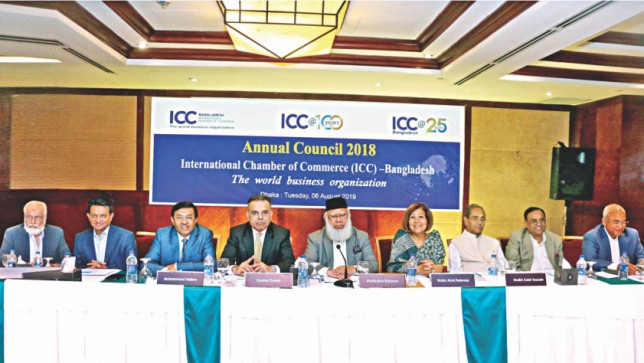Maintaining steady economic growth a big challenge: ICCB

Maintaining steady economic growth and reducing inequality are two big challenges for Bangladesh now, Mahbubur Rahman, president of the International Chamber of Commerce Bangladesh, said yesterday.
The government has to ensure the equal distribution of the benefits of the economic growth among all and for that more importance should be given to delivery of social services, he said.
Rahman spoke while presenting the ICCB’s executive board report at its annual council at a local hotel in Dhaka.
Businesses face regulatory uncertainty on various fronts. Regulatory predictability matters because it makes property rights insecure, thereby constraining investment, he said.
“This leads to uncertainty for businesses – medium-size firms seem to bear the brunt more than large or small firms – and with inconsistencies in policy implementation, it can adversely affect employment growth.”
Bangladesh’s regulatory system needs the establishment of a technical regulatory oversight body at the centre of government to oversee, lead and report on regulatory reforms, he said.
Attaining the target depends on how quickly Bangladesh can resolve the challenges, Rahman said.
Experts suggest that foreign and local investments should be increased and the activities of economic zones should start immediately, he said.
In order to become an upper middle-income country by 2031 and achieve high-income country status by 2041, Bangladesh will require huge investment in physical capital, human capital, and innovation enabled by reforms in areas such as financial sector and business regulation, according to the council report.
The council adopted the executive board report and audited financial statements of the ICCB for the year 2018.
In the development update, the World Bank has noted that private sector investment in Bangladesh remains weak. Initiatives are needed to address several challenges, particularly in boosting private sector investment and diversifying exports, Rahman said.
In the development update, the WB expressed concern over the rise of non-performing loans (NPLs). Directed lending, poor risk management and weak corporate governance lead to the rise in NPLs.
The practice of loan rescheduling and write-offs also increased, putting more stress on banks, the ICCB chief said.
To bring stability and discipline to the financial sector, Bangladesh has to ensure Bangladesh Bank’s autonomy on regulation, integrate risk-based supervision in the central bank’s supervisory framework, tighten rescheduling guidelines and stop ad-hoc rescheduling, he said.
ICCB Vice President Rokia A Rahman; DCCI President Osama Taseer; Bangladesh Insurance Association’s President Sheikh Kabir Hossain; BKMEA former vice president Mohammad Hatem and FICCI Vice President Francois de Maricourt also attended the event.
ICCB board members—Aftab ul Islam, AK Azad, Tapan Chowdhury, Anwar-Ul-Alam Chowdhury (Parvez), Kutubuddin Ahmed and Md Fazlul Hoque—along with ICCB members were also present at the council meeting.
